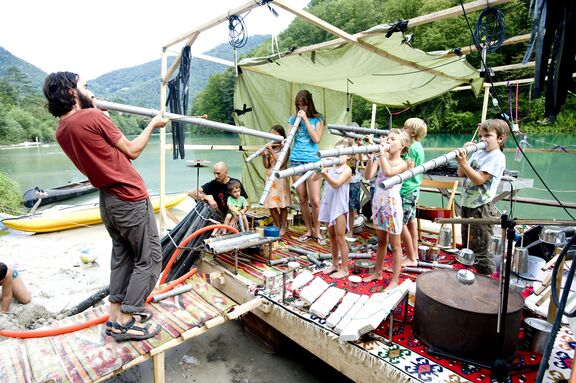Difference between revisions of "Sajeta Creative Camp"
| Line 18: | Line 18: | ||
| dates and duration = 1 week, July | | dates and duration = 1 week, July | ||
| duration weeks = 30 (2012) 31 (2013) 31 (2014) | | duration weeks = 30 (2012) 31 (2013) 31 (2014) | ||
| − | | festival dates = 29.7.2015 - 1.8.2015, 11.7.2016 - 17.7.2016, 3.7.2017 - 9.7.2017, 2.7.2018 - 8.7.2018, 1.7.2019 - 7.7.2019, 29.7.2020 - 6.9.2020, 6.7.2021 - 11.7.2021, 5.7.2022 - 10.7.2022, 5.7.2023 - 9.7.2023 | + | | festival dates = 29.7.2015 - 1.8.2015, 11.7.2016 - 17.7.2016, 3.7.2017 - 9.7.2017, 2.7.2018 - 8.7.2018, 1.7.2019 - 7.7.2019, 29.7.2020 - 6.9.2020, 6.7.2021 - 11.7.2021, 5.7.2022 - 10.7.2022, 5.7.2023 - 9.7.2023, 3.7.2024 - 7.7.2024 |
| contacts = {{Contact | | contacts = {{Contact | ||
| name = Janez Leban | | name = Janez Leban | ||
Revision as of 12:50, 12 January 2024
Background
Created by a group of young enthusiasts from Tolmin, the creative camp was at first a weekend-long event based on artist workshops. A number of artists and performers gathered there in 1998 and 1999, but then for the next two years Sajeta (which is otherwise a mythical creature from those parts and also means a storm) was held on standby. In 2002, the Tolmin Union of Youth Associations relaunched the festival and expanded it with a musical and multimedia programme.
After that, Sajeta gradually became a renowned, about a week-long festival with a (more or less) ambitious musical programme, film screenings, drama performances and literary readings, generating a creative atmosphere unlike any other summer festival and strongly differentiating from the other, more commercially successful and genre-profiled events that also take place on the idyllic Sotočje peninsula, which in itself has in the last decade become the prime spot for summer music festivals.
Somewhat miraculously the festival persists in continuously bringing challenging and curious festival experiences.
Musical and other festival programme
The musicians and groups presented till now are innumerable. A few of the big names are the underground diva Lydia Lunch, the Vienna electronics scene prime protagonists Fennesz, Radian and Thilges 3, electronics pioneers such as Dieter Moebius, Richard Pinhas and Roedelius, folk virtuosos Alexander Balanescua and Lajko Felix. A very exceptional resident of Sajeta is probably the most prolific Slovene jazz musician Zlatko Kaučič, who performed concerts with jazz legends Trevor Watts, Akosh Szeleveny, Louis Sclavis and Peter Brötzmann. But still, the programme is not built on head liners – conversely, it seeks to escape such a paradigm.
Presenting many emerging and established musicians and bands from Slovenia, (the somewhat neglected) Eastern Europe and from elsewhere, the festival has hosted (to randomly select a few) Vasko Atanasovski Trio, Broken Heart Collector, Alzheimer Trio, Bratko Bibič, Orton, Ago Tela, Ivan Volarič - Feo, Psycho-Path, Cirkulacija 2, Random Logic, Borghesia, Vladimir Vaclavek, Uzgun Uver, Korai Orom, Zakarya and Manufacture, The Magic Carpathians Project, East Rodeo, 7 That Spells, Damir Avdić, Rambo Amadeus, Sejiro Murayama, Metalycee, Francesco Cusa, Haradhan Das Baul, and so on.
The almost never-absent rain and storms which happen during the festival are also thought by some to be part of the festival's programme. Any weather goes well along with accompanying programmes: a very strong programme for children, more than a dozen workshops and also lectures, photography exhibitions and video screenings.
International collaborations
At least some of the workshops are always led by foreign artists, pedagogues and collectives; of them, two regulars are the Serbian film makers Kino klub Novi Sad and the Sicilian percussionist Francesco Cusa. Besides that, in 2009 Sajeta started a two-way collaboration with the famous German label Staubgold, whose musicians have had numerous appearances on the Sajeta stage till then. There was also the project Fair Music, within which Sajeta works with MICA (Music Information Center Austria) and International Music Council from UNESCO and which aims to build on the idea of fairness within musical publishing.
There is also the project Sotočja (Confluences) within which they have organised a series of concerts with musicians from different countries that collaborate especially for the festival. One such international project worth mentioning is the the Luminous Synergy Project in which the international crew of the Human Synergy Project and the mostly-Slovene Lighting Guerrilla team used different technologies to create a light and sound installation in the city centre.



